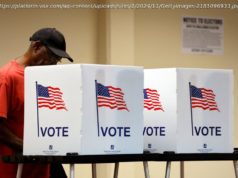A college professor went public for the first time Sunday to accuse President Donald Trump’s Supreme Court pick of sexually assaulting her in the 1980s, prompting calls to postpone the nomination vote.
A college professor went public for the first time Sunday to accuse President Donald Trump’s Supreme Court pick of sexually assaulting her in the 1980s, prompting calls to postpone the nomination vote.
Christine Blasey Ford, a professor at Palo Alto University, initially detailed the allegations about Brett Kavanaugh in confidential letters to her local congresswoman and later to California Senator Diane Feinstein, a senior Democrat on the Judiciary Committee.
Now Ford has told The Washington Post she had decided to waive her anonymity because she felt her « civic responsibility » was « outweighing my anguish and terror about retaliation » after the basic outlines of the story emerged in media last week.
Kavanaugh had previously released a statement on Friday denying the incident, saying: « I categorically and unequivocally deny this allegation. I did not do this back in high school or at any time. »
Ford, who is a registered Democrat herself, told the Post in an interview that one summer in the early 1980s Kavanaugh and a friend, both of whom were « stumbling drunk, » cornered her in a bedroom at a teenagers’ party in a house in Montgomery County, just outside Washington.
Kavanaugh pinned her to a bed while his friend watched, she said, then groped her while attempting to remove her one-piece bathing suit and the clothing on top of it.
When she attempted to scream for help, Kavanaugh put his hand over her mouth.
« I thought he might inadvertently kill me, » said Ford, who is now 51 years old and lives in northern California. « He was trying to attack me and remove my clothing. »
She said she was finally able to escape when another of Kavanaugh’s classmates at his prestigious private school, Mark Judge, jumped on top of them, whereupon all three were sent tumbling and she was able to escape the room, first locking herself in a bathroom briefly before fleeing the house.
She added she did not tell anyone about the attack until 2012 when she brought it up during couples counseling therapy with her husband.
The therapist’s notes from the time, seen by the Post, do not mention Kavanaugh by name but otherwise echo the claim, describing an attack by students « from an elitist boys’ school » who went on to become « highly respected and high-ranking members of society in Washington. »
Notes from a subsequent therapy session a year later describe the attack as a « rape attempt. »
– ‘An insult to women’ –
A number of Judiciary Committee members urged holding off on a vote in light of Ford’s testimony — including Republican Jeff Flake, a vocal critic of Trump, who told the Post that she « must be heard » first.
One of 11 Republicans on the panel with 10 Democrats, Flake’s support is key to moving forward.
The Judiciary Committee is currently due to vote on the nomination on September 20. A vote of the full Senate would follow if the committee approves his nomination.
« I’ve made it clear that I’m not comfortable moving ahead with the vote on Thursday if we have not heard her side of the story or explored this further, » Flake said.
Senator Dick Durbin echoed that call, adding that « we also must respect and listen to Dr. Ford, who is now a target of personal attacks because she had the courage to come forward. »
Senator Feinstein, who had previously forwarded the allegations to federal authorities, wrote on Twitter that « I agree with Senator Flake that we should delay this week’s vote on Brett Kavanaugh’s nomination. »
« There’s a lot of information we don’t know and the FBI should have the time it needs to review this new material, » Feinstein tweeted.
Republican Senator Lindsey Graham said he would « gladly listen » to further comments from Ford, urging it must « be done immediately so the process can continue as scheduled. »
Chuck Schumer, who is the leader of the Democrats in the Senate, also called on the committee’s Republican chairman to postpone the vote so the accusations could be probed.
« For too long, when women have made serious allegations of abuse, they have been ignored. That cannot happen in this case, » Schumer said.
« To railroad a vote now would be an insult to the women of America and the integrity of the Supreme Court. »
The allegations against Kavanaugh are reminiscent of accusations of indecency and abuse by Clarence Thomas that emerged when he was nominated for the Supreme Court.
Anita Hill testified before a US Senate panel in 1991, saying that Thomas repeatedly pressured her to go out, told her « graphically of his own sexual prowess, » and that his attempts to discuss sex or pornographic movies left her « extremely uncomfortable. »
Despite the allegations, Thomas was ultimately confirmed on a 52-48 vote, and he still serves on the bench.






